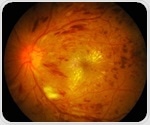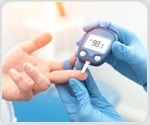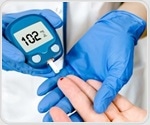
|
|
|
| |

|
|
| |
The latest diabetes news from News Medical |
|
|
|
| |  | | |  A new Northwestern Medicine study has personalized overnight fasting by aligning it with individuals' circadian sleep-wake rhythm - an important regulator of cardiovascular and metabolic function - without changing their caloric intake. A new Northwestern Medicine study has personalized overnight fasting by aligning it with individuals' circadian sleep-wake rhythm - an important regulator of cardiovascular and metabolic function - without changing their caloric intake. | | | | |  A wearable biosensor developed by Washington State University researchers could improve wireless glucose monitoring for people with diabetes, making it more cost-effective, accurate, and less invasive than current models. A wearable biosensor developed by Washington State University researchers could improve wireless glucose monitoring for people with diabetes, making it more cost-effective, accurate, and less invasive than current models. | | | | |  Semaglutide reduced major adverse cardiovascular events in adults with overweight or obesity and established cardiovascular disease regardless of baseline adiposity. Cardiovascular benefit was largely independent of overall weight loss, with waist circumference reduction explaining only part of the effect. Semaglutide reduced major adverse cardiovascular events in adults with overweight or obesity and established cardiovascular disease regardless of baseline adiposity. Cardiovascular benefit was largely independent of overall weight loss, with waist circumference reduction explaining only part of the effect. | | | | |  South Asian adults in the U.S. report doing many of the right things for heart health, yet they show significantly higher rates of prediabetes, diabetes and hypertension than white and Chinese adults, and higher than or roughly similar rates to Black and Hispanic patients, according to a new study led by Northwestern Medicine. South Asian adults in the U.S. report doing many of the right things for heart health, yet they show significantly higher rates of prediabetes, diabetes and hypertension than white and Chinese adults, and higher than or roughly similar rates to Black and Hispanic patients, according to a new study led by Northwestern Medicine. | | | | |  Diabetic retinopathy develops through complex microvascular damage driven by chronic hyperglycemia, yet traditional risk factors such as disease duration or glycemic control explain only part of individual risk. Diabetic retinopathy develops through complex microvascular damage driven by chronic hyperglycemia, yet traditional risk factors such as disease duration or glycemic control explain only part of individual risk. | | | | |  Many people may have a dim view of their fat tissue, yet scientists have come to recognize adipose as a necessary and metabolically active organ, carrying out many vital functions within the body. Many people may have a dim view of their fat tissue, yet scientists have come to recognize adipose as a necessary and metabolically active organ, carrying out many vital functions within the body. | | | | |  Chronic diabetes mellitus is marked by hyperglycemia and metabolic dysfunction, increasing the risk of complications such as nephropathy. Chronic diabetes mellitus is marked by hyperglycemia and metabolic dysfunction, increasing the risk of complications such as nephropathy. | | | | |  An international team of researchers has found that the use of SSRI antidepressants during pregnancy is associated with an increased risk of gestational diabetes and early adaptation problems in newborns, even after taking maternal depression into account. An international team of researchers has found that the use of SSRI antidepressants during pregnancy is associated with an increased risk of gestational diabetes and early adaptation problems in newborns, even after taking maternal depression into account. | | | | | The popular diabetes and weight loss medication tirzepatide (brand name Mounjaro or Zepbound) may lower the risk of diabetic retinopathy, a leading cause of vision loss, according to Weill Cornell Medicine investigators. | | | | | South Asian adults in the U. S. were more likely to have risk factors for atherosclerotic cardiovascular disease (ASCVD) by age 45 when compared to white, Black, Chinese or Hispanic adults in the same age group, according to a study published today in the Journal of the American Heart Association, an open access, peer-reviewed journal of the American Heart Association. | |
|
|
|
|
|
|
|